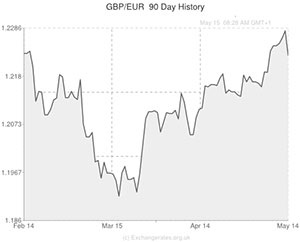
The Pound to Euro exchange rate (GBP/EUR) grew to a yearly high during yesterday’s session as the diverging outlooks of the Bank of England and the European Central Bank continued to drive investors out of the currency bloc and into the United Kingdom.
British economic output has been accelerating strongly for almost a year now and job creation is surging as firms attempt to keep up with demand. It is now estimated that the UK economy will reach its pre-recession peak by the end of this month. This wave of optimism makes it increasingly likely that the Bank of England will be persuaded to start normalising monetary policy sooner rather than later.
On the other hand, private sector activity is improving only modestly in the Eurozone and the unemployment crisis – which is especially alarming for the region0’s youth population – is still a major concern. Additionally, the 18-nation bloc is currently suffering from a period of low price inflation, which is making it difficult for businesses, households and governments to pay back the debts that were accrued during the financial crisis. The threat of deflation is one key reason why the European Central Bank looks very likely to announce fresh stimulus measures to promote growth next month.
With yields on investments in the Pound likely to increase in the next 12 months and yields on investments in the Euro likely to decrease in the next month it is easy to see why traders took GBP/EUR to a fresh 16-month high during yesterday’s session.
The Pound to Euro exchange rate rallied by around a third of a cent yesterday to a new yearly high of 1.2279.
It is possible that the single currency’s plight was exacerbated by comments from two prominent economists. Both ECB Vice President Vitor Constancio and IMF Chief Christine Lagarde told reporters yesterday that it is too early for Europe to claim victory over the debt crisis.
Constancio claimed that the minor growth rates being posted in Eurozone member states were not enough to start talking about an end to the crisis and argued that growth and prosperity need to be delivered to the people of Europe.
Lagarde spoke of the region’s soft inflationary outlook and urged policymakers at the ECB to do more to help spur inflation in the currency bloc.
Data released later this morning is expected to show that the German economic sentiment ZEW survey cooled slightly from 43.2 to 41.0 this month. The report is unlikely to lend the single currency much support versus the Pound.
Later on in the week Sterling could be given a boost if the British unemployment rate falls from 6.9% to 6.8% as expected.

Comments are closed.